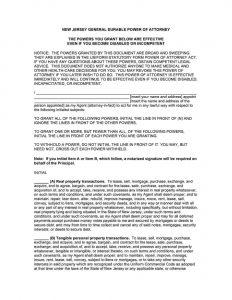Free Fillable New Jersey Power of Attorney Form
Because a power of attorney form has the legal right to sign on behalf of the principal, the position should be delegated to someone with the creator’s utmost trust. This person is labeled as the attorney-in-fact, taking over and signing any necessary documents and setting forth anything necessary to fulfill the decision-maker’s legal obligations. The attorney-in-fact position should go to someone whom the principal trusts with their life. It should be the one who has the creator’s best interest at heart. They should also know and understand the requirements and laws specified as per the State of New Jersey Statute. These New Jersey legal requirements state that:
- The New Jersey Power of Attorney does not allow the chosen representative to make decisions involving the health of the decision-maker in a medical situation
- Creators may only choose one attorney-in-fact. This person will act as the representative according to the parameters specified in the power of attorney
- The chosen representative has the right to have all expenses and costs covered
- Creators may not choose multiple power of attorneys, listing the others as co-representatives when that is the case
- Creators must choose an alternate just if the appointed representative is unable to act in the manner requested by the decision-maker.
Why Use a POA Form in New Jersey
The most common cases where a power of attorney is needed are in situations where an older adult is becoming ill or possibly disabled as a result of a tragic accident. In most cases, a power of attorney form is needed to appoint someone to take over and handle business the principal cannot. However, these are not the only cases that power of attorney forms are good for, taking on many forms. For instance, business owners can appoint an individual to oversee their finances, giving them the right to handle business on their behalf. Individuals can also choose a person that will handle taxes or even take over as a legal guardian for their child in the event of a business affair that results in their absence.
Whatever the case, the principal will need to carefully create the contract and power of attorney form, making sure to assign responsibilities accordingly. These limitations can include the period for which a power of attorney is needed or the specific affairs that the assigned agent can oversee on the creator’s behalf. These examples come with the need to fill out a different New Jersey power of attorney form, some of the most common types discussed below.
General Power of Attorney
A general power of attorney form is perhaps the most commonly used. In this case, the chosen attorney-in-fact has the legal right to act on the creator’s behalf, having access to financial information. This form may not allow for other, more specific rights, needing a different form for that.
Limited/Special Power of Attorney
For anything beyond the creator’s financial affairs, a limited or special power of attorney is needed. In this case, the creator can specify the specifics of the parts that they can oversee, giving them access to medical, tax, and business affairs if needed.
Parental Power of Attorney
A parental power of attorney is used any time a parent or guardian is needed to be out of the country for an extended period (most often more than one year). With this type of POA, creators can pass over the legal right to act as guardian for their child or dependent in their absence, making sure that the child is cared for in the absence of their parent. This could include financial and medical information or anything dealing with the child’s education or housing needs.
Tax Power of Attorney
Anything that deals with the creator’s tax information will need a tax power of attorney form (Form M-5008-R). This could be used in multiple cases, including the preparation of annual taxes or the filing of paperwork that affects a company’s revenue. The chosen representative will have the right to file paperwork and taxes in the name of the creator; however, they are not liable in a misfiling case.
If the principal fails to pay the required fees or is subject to fines related to annual income, it is the principal’s responsibility. The attorney-in-fact will not be subject to any kinds of fines or be held accountable for any of the misfiling or fees owed. Under the tax power of attorney, the chosen representative can act as the creator in signing and preparing information depending on the limitations set in the New Jersey power of attorney forms.
Other New Jersey Forms By Type
Other Power of Attorney Forms By State
- Alabama power of attorney
- AZ power of attorney form
- California power of attorney form
- Colorado power of attorney
- CT POA
- Florida power of attorney form
- Georgia POA
- Idaho power of attorney
- Illinois POA
- Indiana power of attorney form
- Kansas power of attorney
- Kentucky POA form
- Louisiana power of attorney
- Maryland POA
- Ma power of attorney
- Michigan power of attorney form
- MN POA
- MO power of attorney form
- Nevada power of attorney
- NM POAform
- NY power of attorney form
- NC power of attorney
- Ohio power of attorney form
- Oklahoma POA
- Oregon power of attorney pdf
- PA POA
- SC power of attorney
- Tennessee power of attorney
- Texas power of attorney form
- Utah POA
- Virginia power of attorney
- WA POA
- Wisconsin POA form
